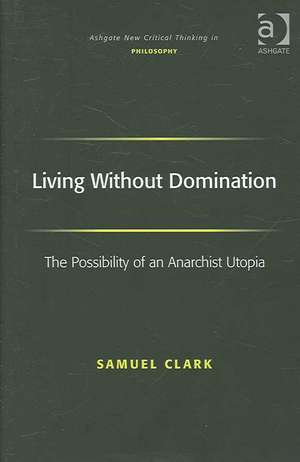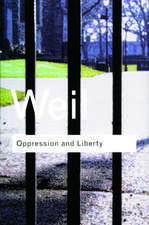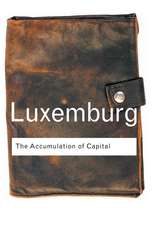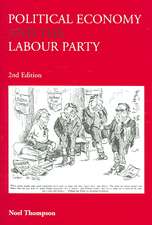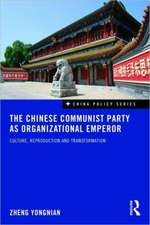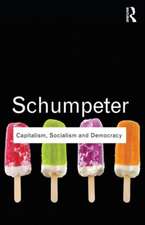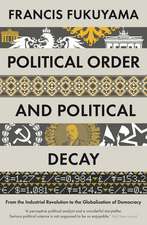Living Without Domination: The Possibility of an Anarchist Utopia: Ashgate New Critical Thinking in Philosophy
Autor Samuel Clarken Limba Engleză Hardback – 28 ian 2007
| Toate formatele și edițiile | Preț | Express |
|---|---|---|
| Paperback (1) | 489.26 lei 6-8 săpt. | |
| Taylor & Francis – 28 noi 2016 | 489.26 lei 6-8 săpt. | |
| Hardback (1) | 1054.71 lei 6-8 săpt. | |
| Taylor & Francis – 28 ian 2007 | 1054.71 lei 6-8 săpt. |
Din seria Ashgate New Critical Thinking in Philosophy
-
 Preț: 466.71 lei
Preț: 466.71 lei -
 Preț: 489.26 lei
Preț: 489.26 lei -
 Preț: 489.26 lei
Preț: 489.26 lei - 25%
 Preț: 324.16 lei
Preț: 324.16 lei - 16%
 Preț: 338.33 lei
Preț: 338.33 lei - 15%
 Preț: 444.10 lei
Preț: 444.10 lei - 18%
 Preț: 997.38 lei
Preț: 997.38 lei -
 Preț: 469.34 lei
Preț: 469.34 lei -
 Preț: 469.34 lei
Preț: 469.34 lei - 16%
 Preț: 299.06 lei
Preț: 299.06 lei -
 Preț: 469.34 lei
Preț: 469.34 lei - 19%
 Preț: 233.51 lei
Preț: 233.51 lei -
 Preț: 469.34 lei
Preț: 469.34 lei - 26%
 Preț: 765.04 lei
Preț: 765.04 lei -
 Preț: 489.26 lei
Preț: 489.26 lei -
 Preț: 469.34 lei
Preț: 469.34 lei - 28%
 Preț: 736.69 lei
Preț: 736.69 lei -
 Preț: 389.38 lei
Preț: 389.38 lei - 18%
 Preț: 1000.27 lei
Preț: 1000.27 lei -
 Preț: 469.34 lei
Preț: 469.34 lei -
 Preț: 469.34 lei
Preț: 469.34 lei - 31%
 Preț: 764.20 lei
Preț: 764.20 lei - 17%
 Preț: 338.33 lei
Preț: 338.33 lei - 17%
 Preț: 338.33 lei
Preț: 338.33 lei - 12%
 Preț: 312.43 lei
Preț: 312.43 lei - 18%
 Preț: 1000.27 lei
Preț: 1000.27 lei - 28%
 Preț: 739.02 lei
Preț: 739.02 lei -
 Preț: 489.26 lei
Preț: 489.26 lei -
 Preț: 480.40 lei
Preț: 480.40 lei
Preț: 1054.71 lei
Preț vechi: 1286.24 lei
-18% Nou
Puncte Express: 1582
Preț estimativ în valută:
201.88€ • 219.36$ • 169.69£
201.88€ • 219.36$ • 169.69£
Carte tipărită la comandă
Livrare economică 21 aprilie-05 mai
Preluare comenzi: 021 569.72.76
Specificații
ISBN-13: 9780754654612
ISBN-10: 0754654613
Pagini: 182
Dimensiuni: 156 x 234 x 13 mm
Greutate: 0.45 kg
Ediția:1
Editura: Taylor & Francis
Colecția Routledge
Seria Ashgate New Critical Thinking in Philosophy
Locul publicării:Oxford, United Kingdom
ISBN-10: 0754654613
Pagini: 182
Dimensiuni: 156 x 234 x 13 mm
Greutate: 0.45 kg
Ediția:1
Editura: Taylor & Francis
Colecția Routledge
Seria Ashgate New Critical Thinking in Philosophy
Locul publicării:Oxford, United Kingdom
Cuprins
Contents: Preface; Introduction; Primitivism; The human landscape; Living with domination; Living without domination; Conclusion; Bibliography; Index.
Notă biografică
Samuel Clark is Lecturer in Philosophy in the Department of Politics, Philosophy, and Religion at Lancaster University. See http://www.lancaster.ac.uk/ppr/about-us/people/sam-clark for more information on his work.
Descriere
This book defends the bold claim that humans can organize themselves to live peacefully and prosperously together in an anarchist utopia. Clark refutes errors about anarchism, utopianism and human sociability and its history. He then develops an analysis of natural human social activity which places anarchy in the real landscape of sociability, along with more familiar possibilities including states and slavery.
